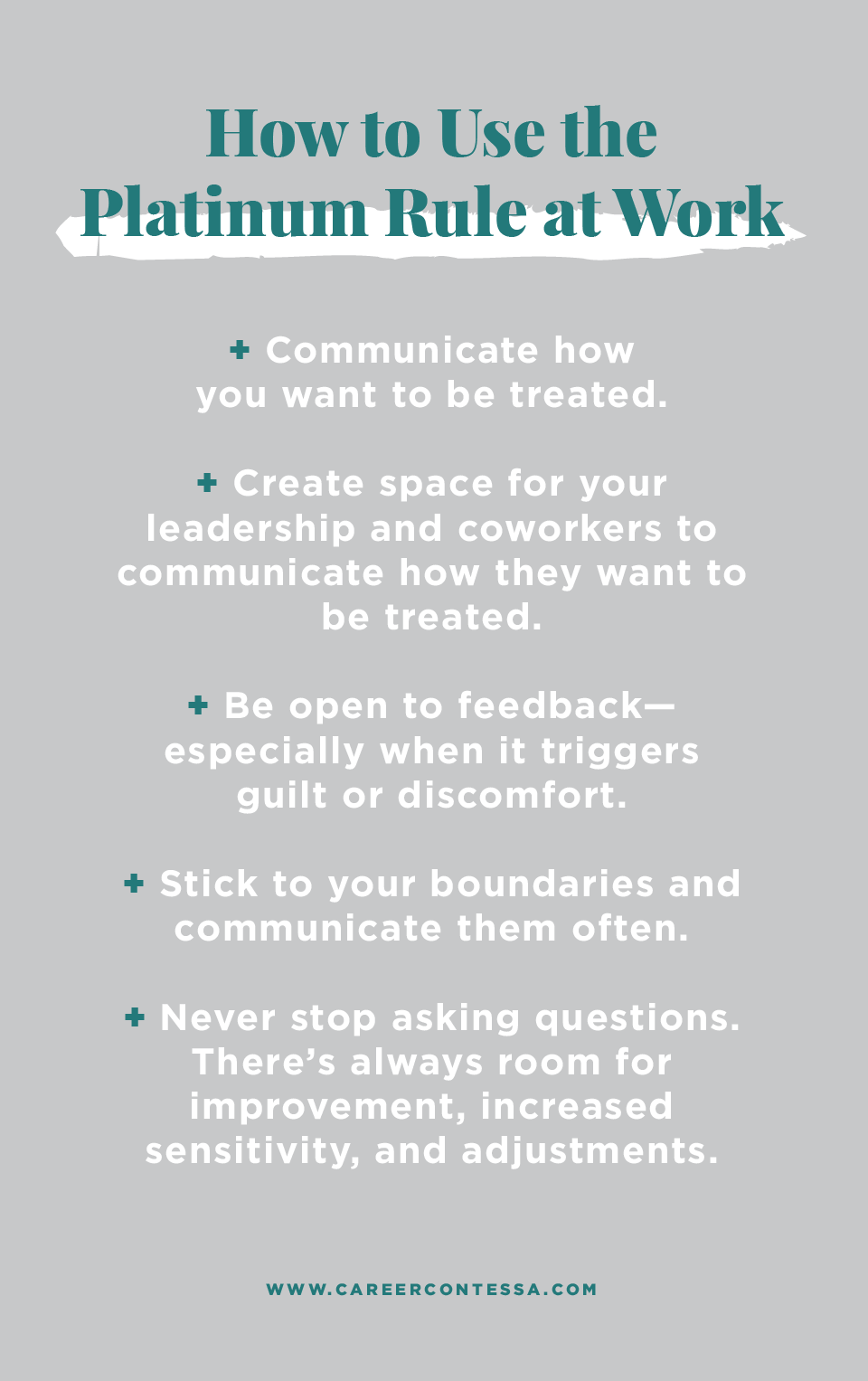What's the Platinum Rule, and why does it matter at work?
If you're like me, your mom (or a similar authority figure) constantly drilled The Golden Rule into you.
When you wanted others to share on the playground, when your very best (but actually pretty crappy) middle school friends were being extra shady, when your college partner was being even shadier, and finally
in the workplace.
By now, you're pretty sure you know how you like to be treated—and you try your best to treat others with the same respect, but is that enough? Maybe not
Table of Contents
What is the Golden Rule?
You're probably familiar with the golden rule, but if not, here's a refresher.
The Golden Rule is the principle of treating others as you would want to be treated. This maxim is found in most religions and cultures. Actually, it's pretty fascinating to see The Golden Rule cited in almost
every religious text in existence. In fact, it dates as far back as Confucian times (551-479 BCE).
The Golden Rule is something we're probably familiar with from our earliest memories. In short, if you don't want your little brother stepping on your face, you might not want to step on his. Sounds easy enough, right?
Well, not so much.
What is the Platinum Rule?
When we originally set out to write this piece, we intended to talk about The Golden Rule. Specifically, we wanted to speak about how you teach others to treat you—but that's only doing about 50 percent of the work.
Early criticism of The Golden Rule came from philosophers such as Immanuel Kant and Friedrich Nietzsche. They objected to the rule for various reasons, but most importantly for one reason in particular.
As one person with a specific background, upbringing, and set of standards, you can only know how
you want to be treated. How does one know how others want to be treated? The short answer is that you don't—not unless
you make it your business to find out. The Platinum Rule is a variation of The Golden Rule that calls for a more thoughtful approach when dealing with others. It asks that you "Do unto others as they would want to be done to them."
Basically, in simple terms, following
The Platinum Rule means making sure you know how the people around you want to be treated. Applying the Platinum Rule involves understanding and respecting the unique preferences of individuals in various contexts, fostering better relationships and collaboration.
Examples of the Platinum Rule at Work
- Communication Style: If someone prefers detailed written instructions, provide them with comprehensive written documentation.
If another person prefers face-to-face communication, schedule in-person meetings or video calls.
- Feedback and Recognition: Offer praise publicly if someone appreciates public recognition.
Alternatively, give private feedback to those who prefer a more discreet approach.
- Work Environment: Respect different work preferences, such as open office spaces versus private offices.
Accommodate flexible work hours for those who value work-life balance.
- Collaboration and Teamwork: Some individuals may thrive in group brainstorming sessions, while others may prefer individual reflection. Cater to both preferences.
Allow team members to choose their preferred communication tools for collaboration.
- Learning Style: Adapt training methods to suit diverse learning styles, such as visual, auditory, or hands-on approaches.
Provide options for self-paced learning for those who prefer to learn independently.
- Conflict Resolution: Some individuals may prefer to address conflicts directly, while others may favor a more diplomatic approach. Respect their preference.
Tailor conflict resolution strategies to align with the emotional needs of the parties involved.
- Customer Service: Offer personalized customer service experiences based on individual preferences.
Provide options for communication channels, such as phone, email, or live chat.
- Cultural Sensitivity: Be aware of and respect cultural differences in communication, greetings, and interpersonal interactions.
Adjust business practices to align with cultural expectations and norms.
- Social Preferences: Respect varying social preferences, such as introversion and extroversion.
Plan social events that cater to a diverse range of preferences, from intimate gatherings to larger parties.
- Time Management: Recognize and accommodate different approaches to time management, whether someone prefers a structured schedule or a more flexible one.

Why the Platinum Rule Matters More Than Ever
In his book,
The Art of People, author Dave Kerpen speaks at length about how The Golden Rule misses the mark. Yes, the intentions are good! They are! But, it's not enough.
Kerpen explains, "The Golden Rule is a splendid concept except for one thing: Everyone is different, and the truth is that in many cases what you'd want done to you is different from what your partner, employee, customer, investor, wife, or child would want done to him or her."
Societally, we are learning to grow and learn about others' unique experiences. It's not acceptable to treat everyone like yourself, because everyone has different struggles, backgrounds,
privileges, and blind spots.
To make things pretty clear cut, Kerpen provides this story,
"Personally I am very fond of strawberries and cream, but I have found that for some strange reason, fish prefer worms. So when I went fishing, I didn't think about what I wanted. I thought about what they wanted. I didn't bait the hook with strawberries and cream. Rather, I dangled a worm or grasshopper in front of the fish and said: 'Wouldn't you like to have that?'"
So, here's the challenging part of The Platinum Rule. When you love a certain way of doing things—whether it's
giving feedback, expressing thanks, or asking questions—everyone is not going to be like you.
Basically, you can choose to accept that fish like worms better than strawberries or you can go a step further—to understand why fish like worms better than strawberries.
Here's something you might need to (however begrudgingly) accept. You may never understand why or how someone prefers to do things a certain way, but by applying The Platinum Rule, especially in the workplace, you'll be fostering an
environment of inclusion and belonging—for everyone, no matter how they differ from how "you like to be treated".
How to Use the Platinum Rule at Work
Now that we understand what The Platinum Rule is, let's see how we can put it into play in the workplace.
1. Communicate Your Preferences
This is exponentially true if you're in a leadership role. We actually think it's an amazing
team-building exercise to get everyone together in order to find out how everyone communicates best.
While you might love cracking jokes over Slack, your coworkers might have important matters at hand—and they simply don't have the time or luxury to joke around. To this end, we created this
communication preference resource that we think every team should get together and complete.
Create space for your leadership and coworkers to communicate how they want to be treated.
2. Be Open to Feedback—Especially When it Triggers Guilt or Discomfort.
Ok, we are no psychologists (not even armchair ones), but I think we can all relate to the following scenario.
You're at work (or with friends) and you crack a joke or use a turn of phrase very lightheartedly. All of sudden, you see someone's face turn—and they say to you, "You know that's incredibly offensive, right?"
Is your knee-jerk reaction to brush them off with a "
lighten up, I'm only kidding" explanation? Our advice is this: don't do that.
Using The Platinum Rule means pushing your guilt or embarrassment to the side and finding out more. Rather than a snap reaction,
consider issuing an apology, learning more, and doing better.
This goes for every person. There is room for every single person to grow their
empathy.
3. Stick to Your Boundaries and Communicate Them Often
Boundaries are no fun, but they're essential.
Boundaries are essential in the workplace and in all relationships you have. Creating boundaries is difficult enough, especially when you tend to be a people pleaser.
Sticking to or defending your boundaries when they're inevitably crossed can seem nearly impossible.
Do it, though. If you have clearly communicated your boundaries, do not hesitate to communicate when one is crossed. If you haven't communicated them yet, take the time to—especially in the moments after it is crossed.
4. Never Stop Asking Questions.
There’s always room for improvement, increased sensitivity, and adjustments.
Like we said, no single person is immune to the lifelong ability to learn more. We can all be more sensitive, understanding, and open to growing through learning.
By applying The Platinum Rule to your over-arching sensibilities—whether dealing with a loved one, a coworker, or a difficult client—you will inevitably gather hundreds of lenses through which to see, understand, navigate, and help others to navigate through the world.












